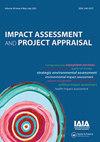复原力评估对影响评估的贡献
IF 1.9
4区 社会学
Q3 ENVIRONMENTAL STUDIES
引用次数: 1
摘要
弹性描述了复杂系统在保持结构和功能的同时承受干扰或从干扰中恢复的能力。弹性评估识别由于干扰、关键变量及其与系统故障相关的阈值而导致的潜在故障路径。它为识别管理干预措施提供了基础,以减少系统对干扰的脆弱性,增强系统结构和功能的恢复。提供了成功应用弹性评估的案例研究。在Ord River灌溉计划的影响评估中,复原力评估为受项目清除威胁的动植物保护策略提供了依据。对管理水质公共卫生风险政策的复原力进行分析,确定了这些政策在可持续管理健康风险方面的长处和短处。在评估大惠灵顿地区湖泊环境方案时,复原力评估确定了管理湖泊价值的关键变量。在怀霍拉湖/埃尔斯米尔湖的多目标规划中,恢复力分析确定了恢复的优先事项,而不会对其他湖泊的价值产生不利影响。保护基督城免受洪水侵害的弹性方法导致了一个方案,以适应大于设计标准的洪水流量。提供了一种弹性评估方法,包括适应周期、失效路径、多空间尺度和管理干预。讨论了复原力评估在项目评估、环境政策、环境计划、恢复优先事项和项目设计中的应用实例。讨论了恢复力评价对影响评价和环境管理的价值。本文章由计算机程序翻译,如有差异,请以英文原文为准。
The contribution of resilience assessment to impact assessment
ABSTRACT Resilience describes the ability of complex systems to withstand disturbance or recover from disturbance while maintaining structure and function. Resilience assessment identifies potential failure pathways due to disturbances, critical variables, and their thresholds in relation to system failure. It provides the basis for identifying management interventions to reduce system vulnerability to disturbance and enhance recovery of system structure and function. Case studies successfully applying resilience assessment are provided. For impact assessment of Ord River Irrigation Scheme, resilience assessment provided the basis for a conservation strategy for flora and fauna threatened by project clearance. Resilience analysis of policies for managing public health risks for water quality identified strengths and weaknesses of these policies for sustainable management of health risks. In assessing environmental programmes for lakes in Greater Wellington, resilience assessment identified critical variables for managing lake values. In multi-objective planning for Te Waihora/Lake Ellesmere, resilience analysis identified rehabilitation priorities without adversely affecting other lake values. A resilience approach to protecting Christchurch from flooding led to a scheme to accommodate flood flows greater than design criteria. KEY POLICY HIGHLIGHTS An approach to resilience assessment is provided comprising adaptive cycles, failure pathways, multiple spatial scales, and management interventions. Examples are discussed of applications of resilience assessment to project assessment, environmental policy, environmental programmes, rehabilitation priorities, and project design. The value added by resilience assessment to impact assessment and environmental management is discussed.
求助全文
通过发布文献求助,成功后即可免费获取论文全文。
去求助
来源期刊

Impact Assessment and Project Appraisal
ENVIRONMENTAL STUDIES-
CiteScore
4.60
自引率
22.70%
发文量
52
期刊介绍:
This is the international, peer-reviewed journal of the International Association for Impact Assessment (IAIA). It covers environmental, social, health and other impact assessments, cost-benefit analysis, technology assessment, and other approaches to anticipating and managing impacts. It has readers in universities, government and public agencies, consultancies, NGOs and elsewhere in over 100 countries. It has editorials, main articles, book reviews, and a professional practice section.
 求助内容:
求助内容: 应助结果提醒方式:
应助结果提醒方式:


